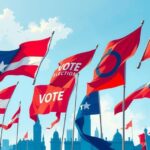Politics
ALLEGATIONS, ASIA, CANADA, CH, CHANDRA ARYA, CHINA, CHRYSTIA FREELAND, DEMOCRACY, ELECTIONS TASKFORCE, GLOBE AND MAIL, HOUSE OF COMMONS, INDIA, INTERNATIONAL RELATIONS, IRAN, LIBERAL PARTY, MEXICO, NARENDRA MODI, NATIONAL SECURITY, NORTH AMERICA, PAKISTAN, SECURITY, VANESSA LLOYD
Nia Simpson
Allegations of Foreign Interference in Canada’s Federal Election Campaign
The Canadian federal election facing allegations of foreign interference, particularly from India and other nations like China, Pakistan, and Iran, as officials warn of sophisticated disinformation campaigns. Concerns have arisen regarding candidates’ relationships with foreign governments and the implications of foreign influence on electoral integrity. The election’s integrity is under scrutiny, necessitating heightened awareness of potential interference as the election date approaches.
The early stages of Canada’s federal election, set for April 28, are already fraught with allegations of interference, particularly from India, alongside concerns about actions from China, Pakistan, and Iran. Senior officials are warning of increasingly sophisticated disinformation efforts aimed at undermining the national vote, especially utilizing artificial intelligence tools to manipulate public opinion and influence diaspora communities. A recent inquiry has emphasized that the manipulation of information poses the most significant risk to democratic institutions.
Vanessa Lloyd, the deputy director of operations for Canada’s spy agency, noted at a recent press conference that many foreign threat actors are adapting their techniques to disguise their interference, complicating detection efforts. Between late January and early February, China reportedly targeted the Liberal leadership bid of former finance minister Chrystia Freeland through a campaign on WeChat, which garnered nearly 3 million views.
Former Liberal leadership contender Chandra Arya was disqualified from the race amid suspicions regarding his relationship with India and susceptibility to external influences. Elected to the House of Commons in 2015, Arya was barred from entering the Liberal leadership race and subsequently informed that he was ineligible to contest in his electoral district, despite being given no further clarification by the Liberal Party.
Sources indicate that Arya traveled to India in August, meeting with Prime Minister Narendra Modi without notifying the Canadian government, especially notable given the heightened scrutiny following the assassination of a Sikh activist on Canadian soil. Arya defended his actions, emphasizing that his engagements were not unusual for a parliamentarian advocating for Hindu Canadian interests and opposing extremist ideologies.
Prime Minister Mark Carney has declared his candidacy for the Nepean electoral district, previously held by Arya. When questioned about whether foreign interference had contributed to delays in the party’s candidate nominations, Carney attributed the postponements to factors other than hostile actions.
Concerns about external influence have also engulfed the Conservative campaign. Allegations surfaced that India sought to interfere in the 2022 leadership race to favor winner Pierre Poilievre, although it is believed that he was unaware of these alleged efforts and insists on the legitimacy of his campaign. However, Canada’s spy agency has withheld information from Poilievre due to his refusal to obtain the necessary security clearance, a decision met with criticism from political observers.
The unpredictability of potential interference extends beyond known foreign actors, with the role of former President Donald Trump raising concerns. Trump, who has engaged in a trade war with Canada, and his associate Elon Musk, linked to the spread of misinformation, may influence the electoral landscape. Nevertheless, Canada’s chief electoral officer, Stéphane Perrault, indicated that there have been no specific threats identified from the United States.
The Canadian federal election is currently shadowed by allegations of foreign interference, particularly from India, China, Pakistan, and Iran. The use of advanced disinformation tactics poses a serious threat to democratic processes. Furthermore, controversies surrounding key political figures and their connections to these nations may precipitate critical discussions regarding national security and integrity in elections. As the election date approaches, vigilance against interference will be paramount.
Original Source: www.theguardian.com








Post Comment